ERP has transcended its traditional role and is now driving front-end functions like sales, marketing automation, and e-commerce, becoming an indispensable aspect of modern business operations.
Further, as the market expands, ERP development services are becoming more advanced under the influence of emerging technologies like generative AI and heightened regulatory reporting obligations. Despite its reputation as a steadfast and inevitable part of business operations, ERP is undergoing significant transformations driven by advancements in technology and evolving customer expectations. Let us look at the top 10 ERP trends
Top 10 Future ERP Trends
Enterprise resource planning serves as a vast repository of data, undergoing a transformative journey with AI integration services, cloud technology, and advanced integrations.
The focus is now on infusing ERP systems with enhanced analytics, machine learning, and automation capabilities to drive efficiency and expand their capacity for handling intricate data analysis, predictive modeling, and real-time decision-making. Moreover, in response to escalating environmental concerns and regulations, sustainability considerations are increasingly embedded within ERP and Supply Chain Management functionalities.
An important trend is the increasing preference for cloud-based solutions in new platform implementations, reflecting a shift towards agile and scalable infrastructure. Given the depth of these solutions. Now let’s discuss these trends one by one which we have carefully curated for you
Cloud Solutions
The rise of cloud-based ERP solutions has been overshadowed in recent years. Studies say that this trend will not show any interruption in 2024, with spending rising from $64.7 billion to an impressive $130 billion. In today’s fast-paced technology world, businesses find themselves in a constant cycle of innovation and have to constantly redefine profitability with newer things. This dynamic environment allows organizations to explore new business models and revenue streams necessary to survive in constant change.
At the same time, the shift to remote workplaces through shared workforces has increased the demand for ERP solutions that are moving in the right direction. While employees and contractors are looking for more flexibility in their work arrangements, businesses are looking for ERP solutions that can provide the essential information, software, and technology to support remote working, along with strong security measures.
Personalization and Innovation
Automation and digitalization are reshaping businesses, driving efficiency gains while mitigating manual errors.
The basis of good business decisions is based on timely and accurate information that helps to understand customer preferences. ERP systems provide greater visibility into data enabling businesses to make timely and effective decisions that appeal to the users.
Information is no longer just a repository of measurements but also plays an important role in facilitating smooth operations. ERP systems form the basis for many tools across multiple departments, enabling effective communication and exchange of information across the organization. This seamless interoperability increases business efficiency by promoting effective coordination and decision-making within the department.
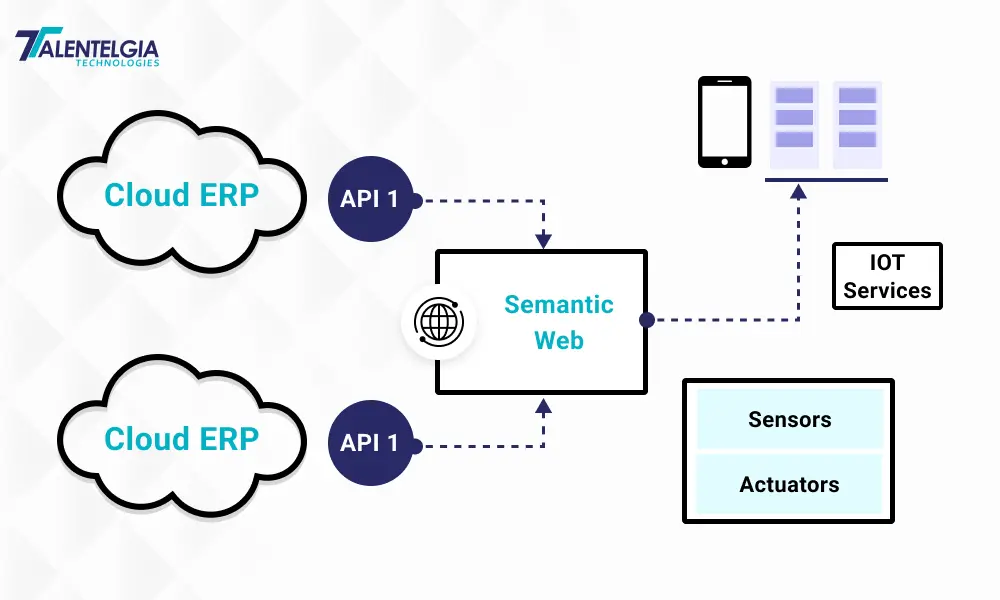
IoT integration
There are many possibilities for the integration of ERP and the Internet of Things (IoT). IoT facilitates the connection of sensors and physical devices, promoting real-time data collection and increasing operational visibility.
This integration allows organizations to collect, analyze, and process large amounts of data, creating a more user-friendly way of doing business. With the integration of IoT and ERP, companies can quickly gain insight into the functioning of machines and production processes, supporting automation and efficiency.
The worldwide growth of IoT devices highlights the need for systems that will enable the transformational potential of IoT.
Industry-Tailored ERP Solutions
Merely 3% of enterprises opt for off-the-shelf ERP functionalities, signaling a distinct preference for industry-specific, or adaptable solutions. While industry-specific software may come at a cost, its tailored functionalities often outweigh the added cost.
Chemical manufacturers, for instance, demand features like material safety data sheet generation and certificate of analysis capabilities. Conversely, automotive ERP systems facilitate warranty management, recall notices, and custom manufacturing details crucial for vehicle production. In the pharmaceutical and healthcare sectors, ERPs incorporate compliance and regulatory features, while agricultural ERPs boast functionalities for crop scheduling, equipment management, and weather forecasts. Additional industry-specific ERPs cater to retail, construction, food and beverage, oil, gas, textile and apparel, HR, and education sectors.
Research and Decision Making
Artificial intelligence algorithms built into ERP systems are constantly being improved to analyze diverse data sets to provide organizations with predictive insights about business dynamics, customer trends, and business nuances.
This change improves the predictive capabilities of ERP systems, allowing businesses to make decisions based on analysis needs, thus moving recycling into a better future.
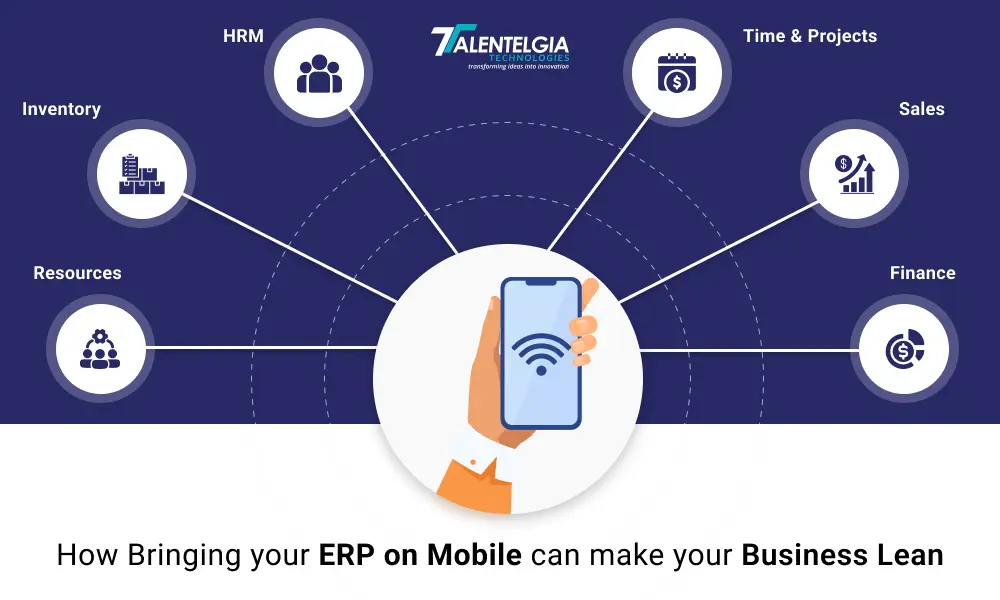
The surge of mobile and adaptable workforce has promoted the trend of ERP on the go, marking it as an ever-growing phenomenon.
The adoption of mobile ERP is swiftly transitioning from a mere option to a fundamental necessity. These solutions facilitate seamless system visibility and accessibility across the organization, catalyzing the acceleration of business processes while enhancing productivity. Moreover, they serve as invaluable resources in conserving time, resources, and costs.
These applications are designed to empower operations to thrive irrespective of geographical constraints. With functionalities ranging from mobile CRM ( customer relationship management) to proof of delivery, warehouse management, point-of-sale (POS) operations, purchase approvals, employee attendance tracking, and beyond, mobile ERP apps have become indispensable allies for modern enterprises seeking to remain agile and competitive in a rapidly evolving business landscape.
Mobile ERP
The surge of mobile and adaptable workforce has promoted the trend of ERP on the go, marking it as an ever-growing phenomenon.
The adoption of mobile ERP is swiftly transitioning from a mere option to a fundamental necessity. These solutions facilitate seamless system visibility and accessibility across the organization, catalyzing the acceleration of business processes while enhancing productivity. Moreover, they serve as invaluable resources in conserving time, resources, and costs.
These applications are designed to empower operations to thrive irrespective of geographical constraints. With functionalities ranging from mobile CRM ( customer relationship management) to proof of delivery, warehouse management, point-of-sale (POS) operations, purchase approvals, employee attendance tracking, and beyond, mobile ERP apps have become indispensable allies for modern enterprises seeking to remain agile and competitive in a rapidly evolving business landscape.
Real-Time Insights
Real-time access to data is essential for decision-making for seeking efficient and informed operations. Managers and professionals rely on real-time analytics tools to optimize asset utilization and ensure reliability and speed. Therefore, analytics becomes the basis for obtaining better insights into performance indicators, delivery management, and efficiency.
Further ERP solutions also enhance the design process by integrating with new technologies such as 3D printing. ERP systems help manufacturers reduce costs and increase efficiency in their production processes by leveraging real-time data processing and interconnections.
Real-time information in the ERP system is integrated with the help of CRM development services. Access to customer data leads to personalized insights that increase sales, engagement, and customer retention, ultimately improving the overall customer experience.
Big Data & Analytics
The emergence of big data and analytics has opened up new revenue streams for cloud ERP vendors as organizations realize the importance of data-driven decision-making. Modern ERP systems now can analyze important data. Research shows that businesses that leverage analytics are more likely to achieve better financial performance, faster time-sensitive decisions, and more effective plans.
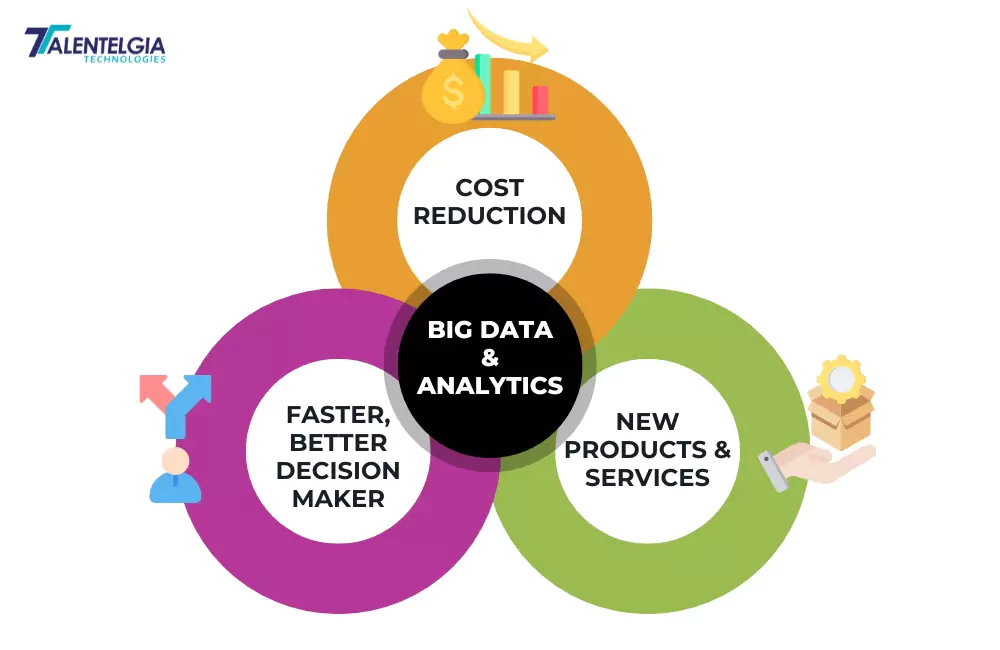
ERP systems include advanced analytics, instant reporting, and data visualization tools to give businesses access to relevant information. This leads to informed decision-making throughout organizations, from production to leadership.
ERP users can expect greater analysis and reporting capabilities. The future of ERP lies in solutions that can manage both data and non-data, allowing organizations to leverage the power of big data analytics.
As ERP solutions collect data from multiple departments and predictive analytics is becoming a core strength of future software platforms. Using predictive analytics, ERP managers can predict future trends and make decisions that will ensure business growth and success.
AI in ERP
With an increasing number of business leaders acknowledging the potential of artificial intelligence (AI), the ERP sector is undergoing a notable shift towards AI integration. Previously, businesses had to rely on separate add-ons to access automation and intelligence features, but today’s ERP solutions seamlessly incorporate these functionalities.
ERP platforms equipped with integrated intelligence technology offer businesses a competitive advantage by enabling advanced data processing capabilities. This goes beyond basic data analysis, marking a significant change in how companies leverage information.
Furthermore, intelligent ERP systems leverage historical data analysis and cross-departmental data integration to propose optimized internal processes. This integration of AI and intelligent technologies within ERP platforms holds the promise of elevating business productivity and overall performance.
Robotic Process Automation (RPA)
Looking ahead, the rapid adoption of Robotic Process Automation (RPA) in repetitive task-driven domains signifies a shift towards strategic focus, empowering employees to allocate time to value-driven initiatives.
Furthermore, the seamless integration of data visualization tools within ERP systems also highlights the newfound ability of businesses to analyze complex datasets effortlessly, facilitating informed decision-making crucial to sustained success.
Moreover, as ERP advancements continue to unfold, the integration of real-time data sharing, analytics, and system integration is a welcome change in the industry. Organizations are using actionable insights, monitor workforce performance, and swiftly adapt to dynamic industry trends, owing to the agility enabled by these developments.
Real-time data sharing within ERP solutions serves as a catalyst for proactive planning, optimized resource allocation, and heightened operational efficiency, equipping organizations to thrive in today’s fast-paced business landscape.
Also Read: Robotic Process Automation Companies in Saudi Arabia
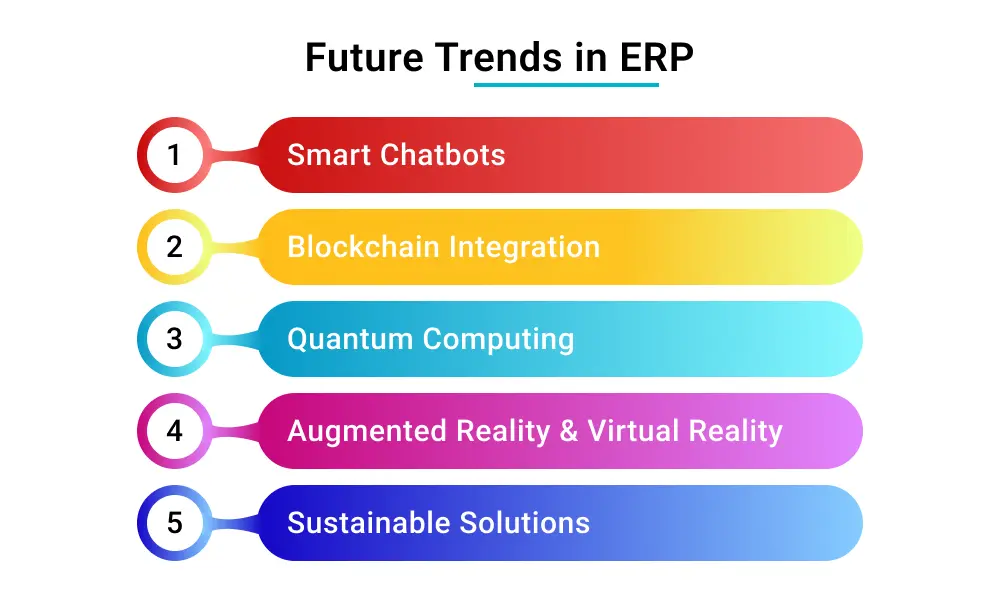
More ERP to Watch Out
Staying ahead requires the adoption of more flexible technology from business operations. Let us look deeper into the ERP technology, to understand innovations that promise to transform business processes and increase performance.
Read below to find out more about the future of ERP, where artificial intelligence (AI), blockchain integration, quantum computing, augmented reality (AR), technology virtual reality (VR), and good practices come together. Thanks to these advances, businesses can open up new possibilities and become more flexible.
Smart chatbots
The future of enterprise resource planning (ERP) technology is about to become a major enterprise, driven by AI-driven. These virtual assistants will change the way businesses interact with ERP systems. By integrating with ERP platforms, chatbots can follow simple instructions, gather information, and perform tasks using simple commands. This makes ERP easier to implement. Therefore as AI technology continues to grow, chatbots will continue to give recommendations that enable businesses to make informed decisions.
Blockchain Integration in ERP
Blockchain technology is becoming the basis of future ERP systems and is expected to increase the security, transparency, and efficiency of information. A Blockchain development company can help with supply chain management. They also provide a comprehensive view of operations while ensuring data integrity and traceability. Additionally, blockchain simplifies financial transactions through transaction automation, eliminating intermediaries and reducing the risk of fraud. As blockchain awareness increases, its integration with ERP solutions will also increase, providing businesses with the power and security to manage sensitive data.
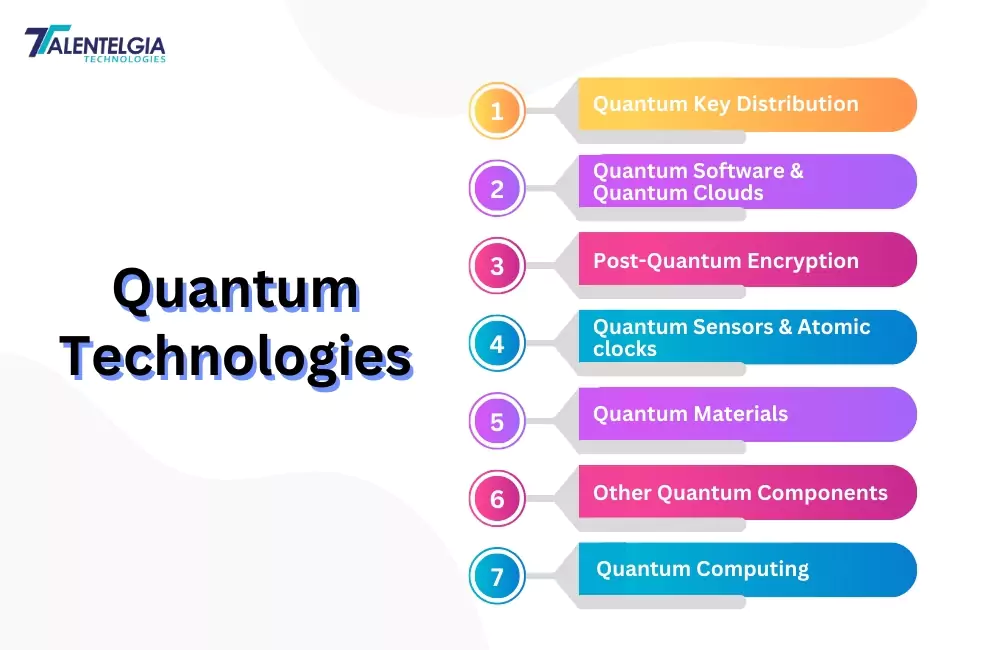
Quantum Computing and ERP
The popularity of quantum computing development signals a new era of ERP systems characterized by unparalleled performance and speed. Quantum computing power enables ERP platforms to process large amounts of data at high speeds. This adds to their decision-making, prediction, and problem-solving capabilities. Although quantum computing is still in its initial stages, its integration with ERP systems has the potential to transform businesses. As technology is evolving, companies need to be careful of the changes it will create in their ERP operations.
ERP in Augmented Reality and Virtual Reality
The integration of augmented reality (AR) and virtual reality (VR) technology with ERP represents the future of ERP systems. AR and VR app development also enhance the ERP experience by providing visualization capabilities. Users can interact with data from 3D models, access data in real time, and solve problems remotely. For example, in a manufacturing environment, technicians with AR glasses can access data and adjust instructions in real time, increasing efficiency and accuracy.
Going forward, ERP solutions will incorporate virtual offices into VR environments to facilitate collaborative data analysis and team meetings. This integration of technology not only improves user interaction and education but also facilitates problem-solving, ultimately improving the ERP user experience.
Sustainable ERP Applications for the Future
Future ERP solutions will have tools designed to help businesses monitor and reduce their environmental footprint. This includes monitoring carbon emissions, improving energy efficiency, and implementing effective waste management strategies. Additionally, ERP’s sustainable practices continue to promote ethical and sustainable product management in society by regulatory requirements and customer needs. By integrating security into ERP systems, companies can achieve global environmental goals, demonstrate corporate responsibility, and promote sustainable growth.
Conclusion
Enterprise resource planning (ERP) systems make it easier to keep up with new standards and remain competitive. The ERP trends show a change in technology and process, updating the traditional operation of ERP systems. From AI cloud solutions to AI integration, IoT connectivity, and business-specific solutions, ERP is on a path of change to meet the changing needs of today’s business world.
Cloud-based ERP solutions provide the flexibility, speed, and accessibility. Further, the integration of artificial intelligence and machine learning enhances the advanced analysis, automation, and prediction capabilities of ERP systems, enabling data-driven decision-making and increasing efficiency.
Additionally, ERP, along with IoT, blockchain, and augmented reality, is expected to transform business processes, promote rapid understanding, enhance collaboration, and improve user experience. Additionally, the focus on sustainability in ERP implementation highlights the importance of environmental responsibility and compliance management in today’s business environment.
Looking to the future, the future features of ERP are innovation, flexibility, and stability. As businesses use intelligent chatbots, quantum computing, and VR/AR integration, they are creating new possibilities. By adapting to these trends and using changing technologies, they can easily become leaders in their industries.


 Healthcare App Development Services
Healthcare App Development Services
 Real Estate Web Development Services
Real Estate Web Development Services
 E-Commerce App Development Services
E-Commerce App Development Services E-Commerce Web Development Services
E-Commerce Web Development Services Blockchain E-commerce Development Company
Blockchain E-commerce Development Company
 Fintech App Development Services
Fintech App Development Services Fintech Web Development
Fintech Web Development Blockchain Fintech Development Company
Blockchain Fintech Development Company
 E-Learning App Development Services
E-Learning App Development Services
 Restaurant App Development Company
Restaurant App Development Company
 Mobile Game Development Company
Mobile Game Development Company
 Travel App Development Company
Travel App Development Company
 Automotive Web Design
Automotive Web Design
 AI Traffic Management System
AI Traffic Management System
 AI Inventory Management Software
AI Inventory Management Software
 AI Software Development
AI Software Development  AI Development Company
AI Development Company  AI App Development Services
AI App Development Services  ChatGPT integration services
ChatGPT integration services  AI Integration Services
AI Integration Services  Generative AI Development Services
Generative AI Development Services  Natural Language Processing Company
Natural Language Processing Company Machine Learning Development
Machine Learning Development  Machine learning consulting services
Machine learning consulting services  Blockchain Development
Blockchain Development  Blockchain Software Development
Blockchain Software Development  Smart Contract Development Company
Smart Contract Development Company  NFT Marketplace Development Services
NFT Marketplace Development Services  Asset Tokenization Company
Asset Tokenization Company DeFi Wallet Development Company
DeFi Wallet Development Company Mobile App Development
Mobile App Development  IOS App Development
IOS App Development  Android App Development
Android App Development  Cross-Platform App Development
Cross-Platform App Development  Augmented Reality (AR) App Development
Augmented Reality (AR) App Development  Virtual Reality (VR) App Development
Virtual Reality (VR) App Development  Web App Development
Web App Development  SaaS App Development
SaaS App Development Flutter
Flutter  React Native
React Native  Swift (IOS)
Swift (IOS)  Kotlin (Android)
Kotlin (Android)  Mean Stack Development
Mean Stack Development  AngularJS Development
AngularJS Development  MongoDB Development
MongoDB Development  Nodejs Development
Nodejs Development  Database Development
Database Development Ruby on Rails Development
Ruby on Rails Development Expressjs Development
Expressjs Development  Full Stack Development
Full Stack Development  Web Development Services
Web Development Services  Laravel Development
Laravel Development  LAMP Development
LAMP Development  Custom PHP Development
Custom PHP Development  .Net Development
.Net Development  User Experience Design Services
User Experience Design Services  User Interface Design Services
User Interface Design Services  Automated Testing
Automated Testing  Manual Testing
Manual Testing  Digital Marketing Services
Digital Marketing Services 
 Ride-Sharing And Taxi Services
Ride-Sharing And Taxi Services Food Delivery Services
Food Delivery Services Grocery Delivery Services
Grocery Delivery Services Transportation And Logistics
Transportation And Logistics Car Wash App
Car Wash App Home Services App
Home Services App ERP Development Services
ERP Development Services CMS Development Services
CMS Development Services LMS Development
LMS Development CRM Development
CRM Development DevOps Development Services
DevOps Development Services AI Business Solutions
AI Business Solutions AI Cloud Solutions
AI Cloud Solutions AI Chatbot Development
AI Chatbot Development API Development
API Development Blockchain Product Development
Blockchain Product Development Cryptocurrency Wallet Development
Cryptocurrency Wallet Development About Talentelgia
About Talentelgia  Our Team
Our Team  Our Culture
Our Culture 
 Healthcare App Development Services
Healthcare App Development Services Real Estate Web Development Services
Real Estate Web Development Services E-Commerce App Development Services
E-Commerce App Development Services E-Commerce Web Development Services
E-Commerce Web Development Services Blockchain E-commerce
Development Company
Blockchain E-commerce
Development Company Fintech App Development Services
Fintech App Development Services Finance Web Development
Finance Web Development Blockchain Fintech
Development Company
Blockchain Fintech
Development Company E-Learning App Development Services
E-Learning App Development Services Restaurant App Development Company
Restaurant App Development Company Mobile Game Development Company
Mobile Game Development Company Travel App Development Company
Travel App Development Company Automotive Web Design
Automotive Web Design AI Traffic Management System
AI Traffic Management System AI Inventory Management Software
AI Inventory Management Software AI Software Development
AI Software Development AI Development Company
AI Development Company ChatGPT integration services
ChatGPT integration services AI Integration Services
AI Integration Services Machine Learning Development
Machine Learning Development Machine learning consulting services
Machine learning consulting services Blockchain Development
Blockchain Development Blockchain Software Development
Blockchain Software Development Smart contract development company
Smart contract development company NFT marketplace development services
NFT marketplace development services IOS App Development
IOS App Development Android App Development
Android App Development Cross-Platform App Development
Cross-Platform App Development Augmented Reality (AR) App
Development
Augmented Reality (AR) App
Development Virtual Reality (VR) App Development
Virtual Reality (VR) App Development Web App Development
Web App Development Flutter
Flutter React
Native
React
Native Swift
(IOS)
Swift
(IOS) Kotlin (Android)
Kotlin (Android) MEAN Stack Development
MEAN Stack Development AngularJS Development
AngularJS Development MongoDB Development
MongoDB Development Nodejs Development
Nodejs Development Database development services
Database development services Ruby on Rails Development services
Ruby on Rails Development services Expressjs Development
Expressjs Development Full Stack Development
Full Stack Development Web Development Services
Web Development Services Laravel Development
Laravel Development LAMP
Development
LAMP
Development Custom PHP Development
Custom PHP Development User Experience Design Services
User Experience Design Services User Interface Design Services
User Interface Design Services Automated Testing
Automated Testing Manual
Testing
Manual
Testing About Talentelgia
About Talentelgia Our Team
Our Team Our Culture
Our Culture
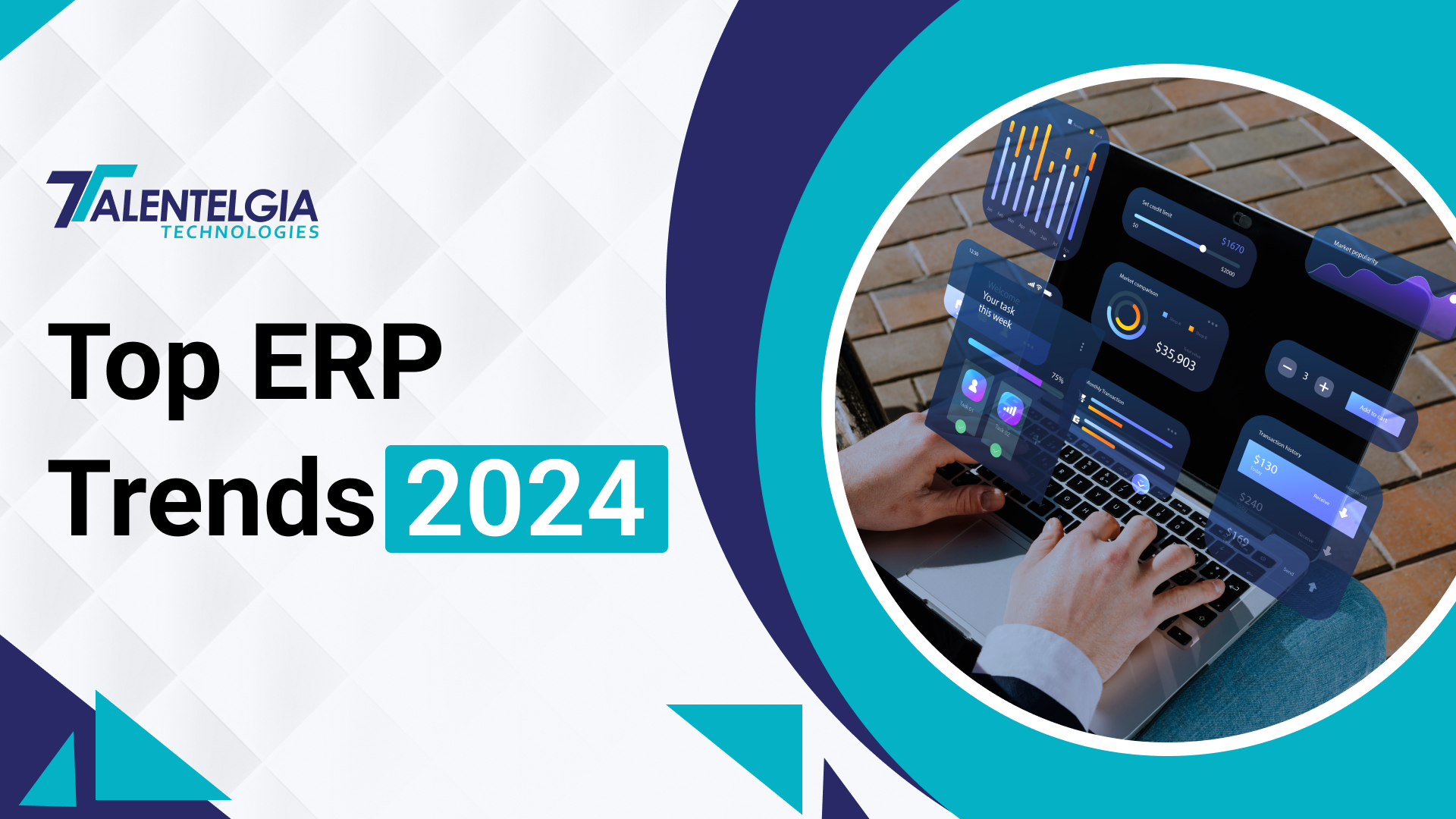

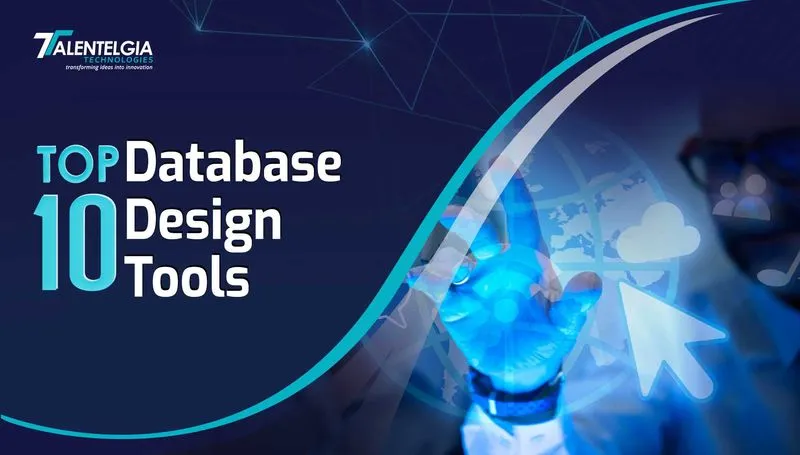














 Write us on:
Write us on:  Business queries:
Business queries:  HR:
HR: 




